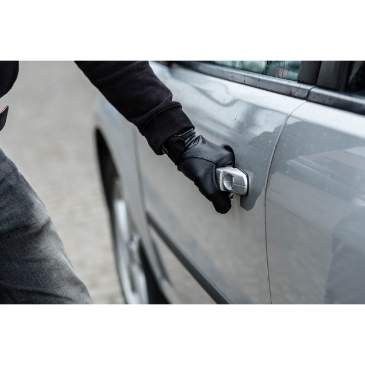When we talk about charges like theft/robbery and carjacking/joyriding, we often use terms interchangeably. However, the terms used to define each charge denote specific elements of each individual crime. You can read here in our previous post how robbery refers to the general taking of property through the use of violence or intimidation.
 Carjacking
Carjacking
TN Code § 39-13-404:
(a) “Carjacking” is the intentional or knowing taking of a motor vehicle from the possession of another by use of:
- A deadly weapon; or
- Force or intimidation.
(b) Carjacking is a Class B felony.
The most obvious difference between robbery/theft and carjacking/joyriding is whether or not it was a vehicle that was taken. You can also see that “carjacking” differs from crimes like robbery and theft, in the sense that “carjacking” doesn’t require that the person taking the car is also intending to keep the car away from the owner. If the state can’t show that the person who took the care was trying to keep, sell, or otherwise deprive the owner of the car, then carjacking might be the charge they pursue.
Lawyer’s note:
“Oftentimes, carjacking is overcharged and actually fits the elements of Joy Riding. Although, Joyriding sounds like a great time. We can assure you, the state does not see it that way.”
Joyriding
Joyriding is another general term used to refer to different, albeit similar charges. It also is tailored specifically to the taking of a vehicle, but only requires proof that a vehicle was taken without the consent of the owner. You can think of joyriding as a “step below” carjacking, as it doesn’t require that a weapon, force, or intimidation be used during the taking. The more common joyriding charge is defined by the “Unauthorized Use” statute, and probably what most of us think of when we hear “joyriding”.
Unauthorized Use of an Automobile
TN Code § 39-14-106:
“A person commits a Class A misdemeanor who takes another’s automobile, airplane, motorcycle, bicycle, boat or other vehicle without the consent of the owner, and the person does not have the intent to deprive the owner thereof.”
This charge is used when the suspect does not have the intent to deprive the owner of the vehicle, as opposed to carjacking, which requires a forceful taking and doesn’t consider the intent of the defendant. It also refers to any taking of any vehicle and doesn’t require that any sort of method, weapon, or scale of force be used. The “Unauthorized Use” statute covers our more colloquial understanding of joyriding. But there are other “joyriding” laws that cover any instance in which you might be using a vehicle you don’t have permission to use. There is another joyriding statute that specifically describes instances when vehicles were rented fraudulently, or if the terms of returning a rental vehicle were broken.
Temporary Taking of Vehicle – Joyriding – Neglect to Return
TN Code § 55-5-104:
(a) Any person who, with intent to defraud the owner of any motor vehicle or a person in lawful possession of the motor vehicle, obtains possession of the vehicle from the owner, or the servant, agents, or employees of the owner, by agreeing in writing, to pay a rental for use of the vehicle based in whole or part on the distance the vehicle is driven, commits a Class E felony.
(b) Obtaining possession of the vehicle by means of trick, false or fraudulent misrepresentation, or false impersonation of another, or by giving a bad or worthless check as a deposit or in payment of the rental, in obtaining possession of the vehicle, shall be prima facie evidence of intent to defraud.
(c) Any person who, after hiring, leasing, or renting a motor vehicle under an agreement in writing, which provides for the return of the vehicle to a particular place, or at a particular time, abandons this vehicle, or refuses or willfully neglects to return the vehicle to the place and at the time specified in the agreement, or who secretes, converts, sells or attempts to sell the motor vehicle, or any part of the motor vehicle commits a Class E felony.
(d) The failure, or refusal, or neglect to return the vehicle within seventy-two (72) hours subsequent to the date or time specified in the written agreement shall be prima facie evidence of willful intent to violate this section; provided, that failure, refusal or neglect to return the vehicle within the seventy-two-hour period shall not be evidence of willful intent if the person provides written notification to the owner within the seventy-two-hour period of the person’s intention to return the vehicle and returns the vehicle within twenty-four (24) hours of the notification, or when agreed upon by the owner and the person, and if the person pays the fair rental value for the vehicle.
(e) A violation of this section is a Class E felony.
Even though this statue uses the word “joyriding”, this charge doesn’t apply to what we would typically think joyriding to be. This statue is narrowly tailored to those situations in which you either lied in order to obtain a rental vehicle or if you didn’t return the vehicle in time.
Lawyer’s note:
“We see joyriding charges most often when family members, significant others, or friends of the accused let them borrow their car and it is not returned in a timely fashion. The Court will often defer to the victim’s desires regarding final disposition in this scenario.”
Contact us online today for a free consultation if you or a loved one is facing carjacking or joyriding charges.
